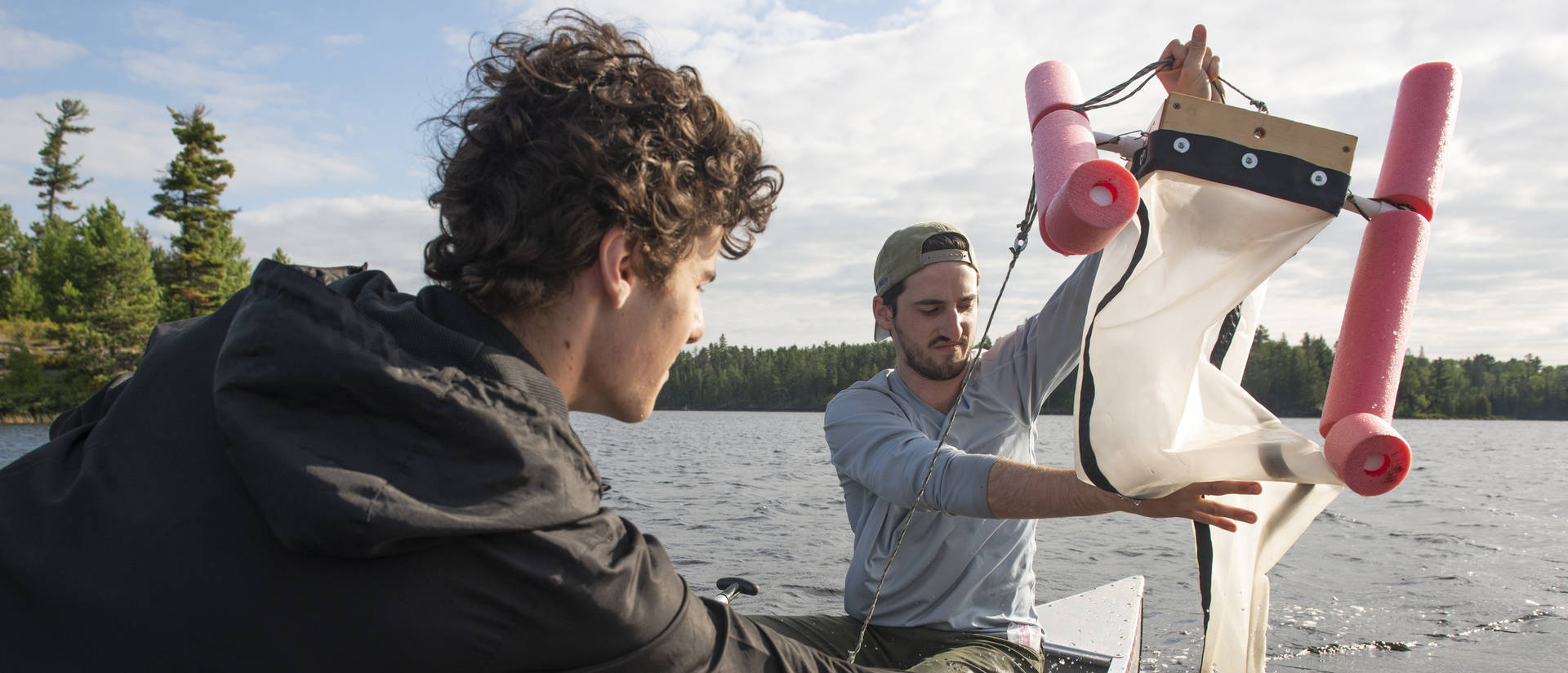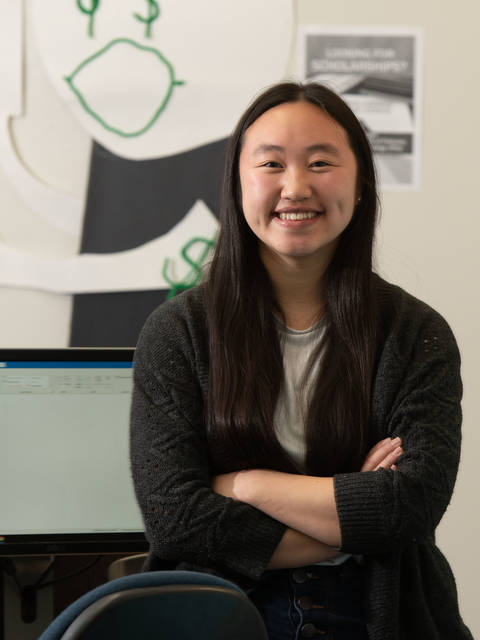
50 years of research
Shaping lives, changing the world
By Judy Berthiaume

Chemistry major and student researcher Mai Yer Yang
Growing up, Mai Yer Yang wanted nothing more than to blend in with her peers, so she’s surprised to find herself so proudly wearing a trailblazer label.
“I’m the first in my family to do research,” says Yang, a chemistry major and first-generation college student. “I lit the torch.”
Hopefully, she says, her younger siblings and other future Blugolds now will follow her lead and make research part of their own college journey.
For more than 50 years, UW-Eau Claire has been supporting students like Yang — bright, curious, ambitious students — as they engage in research and creative projects that encourage them to use the knowledge and skills they’re gaining in their classrooms to help find answers to real-world questions.
“Early on, it was mostly scientists and social scientists who involved students in their research,” says Dr. Karen Havholm, the recently retired leader and long-time advocate for UW-Eau Claire’s nationally recognized faculty-student collaborative research and creative projects program. “Today, it’s a focus in every part of UW-Eau Claire as faculty in all disciplines see the value in involving students in research and creative projects outside of the classroom.”
More than half of UW-Eau Claire’s faculty collaborate with students on research, and nearly 50 percent of students have an in-depth experience outside the classroom during their college careers, Havholm says, noting that research skills also are integrated into curriculums in many academic areas.
Some academic programs, such as history, require that every major complete a research project for their senior capstone, ensuring students graduate with the skills they’ll need to be successful in their future careers.
Faculty know that research experiences increase students’ academic performance and boost graduation rates, so they collectively put in thousands of uncompensated hours developing projects and mentoring their students, Havholm says.
Based on formal and informal feedback, students and alumni appreciate the time and energies faculty invest in them, Havholm says. Blugolds often share stories about how they use the lessons learned from their research experiences in their jobs, and in an alumni survey, 60 percent of the respondents said skills learned through their undergraduate research helped them get their current job.
“They recognize that the skills they gain go beyond the obvious,” Havholm says. “They learn how to identify and solve problems, implement solutions and tell people about it. That’s a set of skills that’s invaluable and universal.”
Changing the world
While some students work on research alongside faculty on campus, undergraduate research projects also take many Blugolds into nearby communities or to countries.
Whether on campus or across the globe, the experiences provide incredible learning opportunities while also helping them address real-world issues, Havholm says.
Faculty and students from every academic area are asking questions, finding answers and sharing new knowledge with the campus and the world beyond, Havholm says.
For example, Courtney Wiemer, a criminal justice major and non-traditional student, traveled to Taiwan, where she and other students researched the criminal justice system, increasing their understanding of multicultural justice and policing practices.
Olivia Haven, a choral music major, searched websites, talked with experts and visited performance venues in different cities as she researched sensory-friendly theater performances.
As a result of her team’s research, this spring, for the first time, UW-Eau Claire was able to modify a theater performance — “James and the Giant Peach” — to meet the needs of neuro-diverse audiences.
And last summer, Reed Kostelny and his research team traveled to the Boundary Waters Canoe Area and Wilderness, where they determined that microplastics have made their way into the popular wilderness area in northern Minnesota.
UW-Eau Claire’s study is believed to be the first to confirm the presence of microplastics in the Boundary Waters, the most visited wilderness area in the United States, says Kostelny, an environmental biology major.
“It’s a big deal,” Dr. Todd Wellnitz, a professor of biology and the faculty lead on the project, says of the findings. “Microplastics are everywhere now. It’s all over the planet and we’re just realizing it.”
The student researchers are raising awareness about the impact humans are having on the world around them by sharing their research with schools, presenting at regional and national meetings and conferences, and submitting papers to professional journals.
That process of identifying a problem, posing a question, working to find an answer and sharing the findings is at the heart of every UW-Eau Claire research project, be it in nursing, education, business or the humanities, Havholm says.
“The complexity and variety of the research and creative projects our students and faculty are engaged in is impressive by any measure,” Havholm says. “Through their research, they’re making contributions that go far beyond the campus.
“After decades of creating these kinds of experiences, it’s now embedded into the fabric of our campus. It’s part of what makes us so distinctive.”
In the spotlight
UW-Eau Claire’s success in supporting undergraduate research has earned the university multiple state and national honors.
In 2016, the Council on Undergraduate Research awarded UW-Eau Claire its top research award, acknowledging the program’s long history of success, as well as its ongoing efforts to grow its research program to meet the needs of even more students, including many from traditionally underserved and/or underrepresented student groups.
Since 1988, UW-Eau Claire has been the UW System’s only designated Center of Excellence for Faculty and Undergraduate Student Research Collaboration.
When the center was established, its goals were to increase opportunities for collaborative student-faculty research, incorporate research results into the curriculum, identify and address issues requiring multidisciplinary solutions, and provide a public service by contributing to economic development.
“We’ve been successful in not only meeting but exceeding every goal that was set for us more than 30 years ago,” Havholm says. “Building on years of grassroots activity, visionary faculty, staff and administrators have continuously taken steps to support and enhance students’ scholarly activities. The results are outstanding.”
Students and their faculty mentors regularly present their research at professional conferences and other events throughout the United States.
Each year, hundreds of students and faculty also share their research and creative projects with the campus community during UW-Eau Claire’s weeklong Celebration of Excellence in Research and Creative Activity.
By sharing their research findings, students gain experience presenting complex information, provide others with valuable knowledge, and encourage continued study in their topic of interest.
Preparing Blugolds for success
While the research projects and findings vary widely across campus, the skills that Blugolds take from the experience often are similar, Havholm says.
Students learn the mechanics of engaging in research, but they also strengthen their communication, problem-solving and other skills that employers in all fields say are highly valued, Havholm says.
That’s true for Yang, who says her research experiences also helped her connect with faculty and gain confidence in her own abilities.
“I had to talk with professors about their research when I was trying to find my place,” says Yang. “I had to ask questions and tell them why I wanted them to be my mentor. I’m more confident and comfortable and that feels good. I know I belong here.”